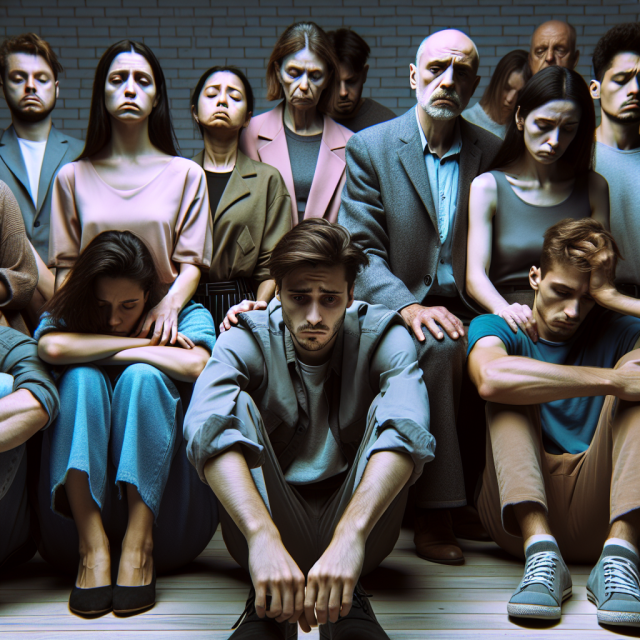
Introduction:
Depression isn’t just feeling sad—it’s a heavy cloud that lingers, affecting your thoughts, emotions, and even your body. Many people struggle with it silently, not realizing they are experiencing symptoms of depression. Recognizing these early signs can be life-saving. Whether you are experiencing these feelings yourself or supporting a loved one, understanding what to look for can help you seek support sooner. In this article, we’ll break down the most common symptoms of depression, how they manifest, and when it’s time to reach out for help.
Table of Contents:
What is Depression?
Depression is a mental health disorder that affects how you feel, think, and handle daily activities. It’s more than just feeling sad for a few days. It’s like being stuck in a fog that doesn’t lift, no matter what you do. Depression can be triggered by chronic illness, trauma, or sometimes, it appears without an obvious cause.
According to the World Health Organization (WHO), over 280 million people globally experience depression. It affects people of all ages, including those living with chronic conditions like arthritis, diabetes, or cancer.
Common Symptoms of Depression
Depression has many faces—it can look different for everyone. But some signs are common:
- Persistent Sadness: Feeling down, hopeless, or empty for most of the day.
- Loss of Interest: Activities you once enjoyed now feel like chores.
- Fatigue: Feeling drained, even after a full night’s sleep.
- Difficulty Concentrating: Trouble focusing or making decisions.
- Irritability: Becoming easily annoyed or frustrated.
- Guilt or Worthlessness: Harsh self-criticism or feelings of failure.
- Changes in Appetite: Eating much more or less than usual.
Have you felt like you’re carrying an invisible weight? This is what depression often feels like—heavy, isolating, and exhausting.
Physical Symptoms You Shouldn’t Ignore
Depression isn’t just in your head—it affects your body too:
- Unexplained Aches and Pains: Headaches, back pain, or stomach issues with no clear cause.
- Sleep Disturbances: Trouble falling asleep, staying asleep, or oversleeping.
- Slowed Movements or Speech: Feeling physically weighed down.
- Restlessness: Feeling agitated or unable to sit still.
- Decreased Energy: Struggling with everyday tasks like cooking or cleaning.
People with chronic illnesses often mistake these physical signs for symptoms of their condition, overlooking depression. If you notice these alongside feelings of sadness, it’s time to speak to your doctor.
Emotional and Behavioral Signs
Depression can alter how you think, behave, and engage with the world around you:
- Withdrawal from Friends and Family: Avoiding social events or isolating yourself.
- Substance Use: Turning to alcohol or drugs to cope.
- Self-Harm or Suicidal Thoughts: Feeling that life isn’t worth living.
- Procrastination: Struggling to complete even small tasks.
- Sudden Mood Swings: Feeling fine one moment and overwhelmed the next.
If you or someone you know is experiencing these signs, reach out for help immediately. Suicidal thoughts are a medical emergency—call 911 or a local crisis line without delay.
When to Seek Help for Depression
Wondering if your feelings are serious enough for help? Here’s when to reach out:
- Symptoms Last More Than Two Weeks: Sadness from time to time is normal. Ongoing symptoms are not.
- Your Daily Life is Affected: Work, relationships, or hobbies are suffering.
- You Have Suicidal Thoughts: Seek help immediately.
- Physical Symptoms are Persistent: Pain and fatigue without a clear cause.
- You’re Using Substances to Cope: Alcohol or drugs worsen depression.
Therapies such as Cognitive Behavioral Therapy (CBT) and medications like Prozac (fluoxetine), Zoloft (sertraline), or Lexapro (escitalopram) can help manage symptoms. Consult a mental health professional to explore treatment options.
Find additional resources at HealingWell’s Depression Community
Supporting a Loved One with Depression
Depression can make loved ones feel distant, but your support matters more than you know. Here’s how to help:
- Listen Without Judging: Sometimes, being heard is the greatest comfort.
- Offer Practical Help: Assist with daily tasks like groceries or appointments.
- Encourage Professional Help: Gently suggest therapy or counseling.
- Stay Patient: Recovery takes time, and setbacks happen.
- Educate Yourself: Learn about depression to understand their experience better.
Joining a support group, like HealingWell’s Mental Health Community, can also help you connect with others supporting loved ones through depression.
Conclusion:
Depression is more than sadness—it’s a complex condition that affects your body, mind, and soul. Recognizing the symptoms of depression is the first step toward getting help. Whether you’re struggling personally or supporting someone you love, know that you are not alone. There is hope, and help is available. With the right support and treatment, healing is possible.
FAQs on Symptoms of Depression:
1. What are the earliest symptoms of depression?
Early symptoms include persistent sadness, loss of interest in hobbies, fatigue, and changes in sleep or appetite.
2. Can depression cause physical symptoms?
Yes, depression can cause headaches, body aches, fatigue, and digestive issues.
3. How long do symptoms of depression last?
Symptoms lasting more than two weeks may indicate clinical depression. Seek professional advice if they persist.
4. What medications are commonly prescribed for depression?
Common medications include Zoloft (sertraline), Prozac (fluoxetine), and Cymbalta (duloxetine). Your doctor will help choose the best option.
5. How can I support a loved one showing symptoms of depression?
Offer emotional support, encourage professional help, and be patient during their recovery.
This content is not medical advice. For any health issues, always consult a healthcare professional. In an emergency, call 911 or your local emergency services.




